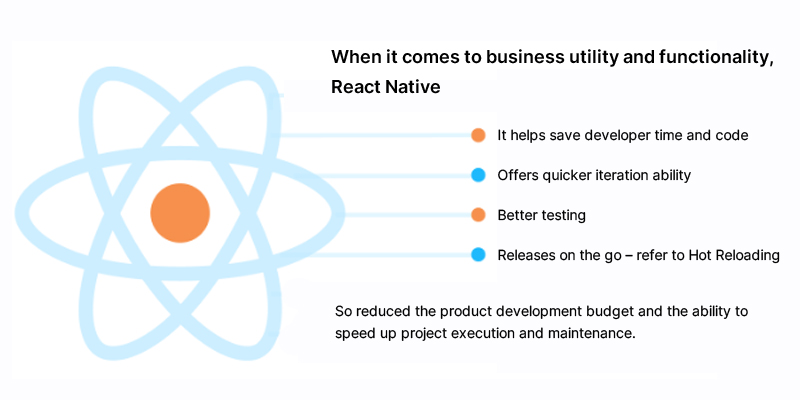You may have noticed that some mobile apps are specific to Android or iOS devices. These are called native apps and are becoming more popular. The problem is, building traditional native platforms is a slow and complicated process. Thus, to provide a simpler & quicker way to build native apps, and software development companies choose React Native.
The statistics say –
By 2025, 70% of employees will work remotely. Outsourcing is one of the most popular options for hiring remote developers. It allows companies to focus on their core business and save valuable time.
The global IT outsourcing market was valued at 342.9 billion USD in 2020 & is expected to reach 10.2 billion USD by 2027.
First, let’s start with the basics:
What is React Native?

React Native is a framework based on JavaScript that enables developers to construct mobile applications for both of the leading platforms- iOS and Android. It is based on Meta’s ReactJS. React Native uses a combination of Javascript, JSX, and XML-like syntax.
React Native apps use native graphics APIs in Java for Android and Objective C for iOS. React Native mobile apps may access the user’s location, phone camera, and other features on the device by providing appropriate interfaces to platform APIs. As a result, the developers can use web-based JavaScript to create outstanding mobile applications.
Why does your business need React Native?
Because it saves money, is quick in development, augments your team, and is in high demand among React developers.
React Native helps you build cross-platform apps, build MVPs quicker, reduce development complexity, and update apps on the go. So naturally, React Native developers are in demand.

When it comes to business utility and functionality, React Native –
- It helps save developer time and code
- Offers quicker iteration ability
- Better testing
- Releases on the go – refer to Hot Reloading
So reduced the product development budget and the ability to speed up project execution and maintenance.
Also Read: Using React Native to Develop Modern and Robust Mobile Apps
Now that we have figured out the feasibility of building apps on React Native, here is a detailed roadmap of what you need to know when hiring React developers. Let’s proceed –
React Native Developer – Roles & Responsibilities
Before enrolling a React Native Developer, these are some of the roles & responsibilities to look for.
- Ability to create highly dynamic websites and applications.
- Ability to find and fix bugs to make the code error and bug-free.
- By removing the restriction, it is possible to increase the productivity of a close-to-native program.
- Ability to store easy-to-understand code.
- Create automation checks to simplify software testing.
- Ability to use native APIs for tight integration into all frameworks.
- Opportunity to ultimately convert a React Web App into a React Native.
- React Native App is used to create new functionality for users.
- Create interchangeable front-end modules and repositories for potential use.
- Create high-quality programming from prototypes and wireframes.
- Elements optimized for maximum efficiency cross-platform and Web-compatible browsers.
The Advantages of Hiring React Native Developers
- An extensive developer community: The developer community provides a wealth of support, training materials, and assistance to developers.
- Support for hot reloading: React Native includes a hot reloading plugin that enables React components to load dynamically without losing state.
- Third-party plugin support: The platform developers may simply utilize third-party extensions, giving their framework more flexibility and customization.
- The developers may repurpose up to 90% of their code, resulting in less development time. Companies save time and costs by not having to design two different apps.
- Real-time feedback and preview: The developers working on React Native like the ability to see the changes they make to their code in real-time. They can make the best decision by examining the adjustments and considering real-time input.
- Flexible architecture: React Native developers may easily collaborate with their team on their code. The adaptable design allows other React Native devs to provide recommendations while allowing for simple changes.
- SEO-friendly: With React Native, the developers may construct applications that load quickly. This helps them achieve a higher SEO ranking and more traffic.
Have you decided to hire a remote React Native developer to build your project but are struggling to find the right talent or the right resource?
At Netsmartz, we help companies looking to hire React Native developers worldwide. This article will share everything you need to know to get a smooth recruitment process—a Checklist of sorts to help you ease hiring a React Native Developer.
How to Hire a Remote React Native Developer for your Business?
Hiring remote developers requires some preparation. Here are some tips that can help you through the hiring process.
1. Clear Definition of Requirements
First, you must define your project requirements and consider how your application will run. Here are some tips to follow when defining requirements:
- Describe the project in general. You need to identify the critical features of your product, the problems it solves, and who will use it.
- List out the Features. Define the core functionality for the experience to look for.
- Select a platform. Think about the media your application will run on. If you have a sufficient budget, you can use both platforms.
Knowing these aspects will give you a precise idea of what level of developer you are trying to hire for your project.
2. Consider Different Hiring Options
Before making a decision, you need to understand your hiring options and which best reflect your project goals. There are three main recruiting options.
- Freelancers: Freelance React Native developers are the right choice if you have a small project and have an expert on your side to manage them.
- In-house: This is a perfect decision if you have many projects and want complete control of the development process. Also, this option is more suitable if you are looking for full-time employees.
- Staff Augmentation: If you want to expand your internal team or free it up for other activities, This option will let you do that with the help of an outsourcing company.
3. Choose Hiring Location
Consider hiring professionals from other countries when hiring remotely. One of the main advantages of outsourcing companies is that they already work with experienced developers. So you won’t waste time looking for an expert, dealing with all the financial and legal issues, and drafting the development contract.
4. Consistent Interview Process
After you’ve understood where to find remote developers, it’s time to figure out how to interview them. You can follow the steps to conduct remote technical interviews professionally and efficiently.
Set goals: Before settling on a choice, define your goals – exactly why you need a remote developer. State the responsibilities and hard and soft skills of your ideal candidate.
First Screening: Cultural background and personal values are adequate for successful remote team management. Live video calls are a successful way to gauge employee value.
Technical Interview: The interview will determine if the candidate has enough experience to work on your project. You can talk with your developers or hire an independent technical consultant to evaluate the developer’s understanding.
5. Must-have Skills to Look at When Hiring
A React native developer must have specific skills to be effective, some of which are “must-have” skills. They are –
- Solid understanding of JavaScript as it is at the core of React Native. It is at the center of cross-platform mobile app development.
- Knowledge of React tools like JSX and Virtual DOM is a must when hiring a React Native developer.
- Ability to write clear, well-documented code for easy app development and further maintenance.
- Candidates should be familiar with native building tools such as Swift, Kotlin, Java, XCode, or Gradle for Android and IOS.
- Excellent interpersonal and communication skills to communicate effectively with colleagues and superiors.
Also Read: 10 Common React Native App Development Mistakes for Startups
Checklist for hiring React Native developers for your project
Beyond this, you can consider the following checklists for skill assessment for a potential React Native Developer hire:
- Knowing React Native basics (libraries, components, and APIs)
- React Native provides several built-in Core Components ready to use. In that context, have a go at the developer’s proficiency with the core components such as Basic Components, User Interface, List Views, Android-specific, iOS-specific, etc.
- Mobile hardware functionality (GPS, camera, gyroscope, and many others) for better and more enhanced native apps
- Third-party service integration using their APIs
- Turning iOS and Android apps into React Native apps (knowledge of programming languages such as Objective-C, Swift, JavaScript, and Kotlin) in case the developer has to work to port the older apps.
- Continuous integration (CI) and continuous delivery (CD)
Final Thoughts
So here’s everything you need to know before hiring a native remote reaction developer. Follow all the steps in our guide to hiring a dedicated remote react developer or contact us to get the right talent for your business projects.
At Netsmartz, we support companies that wish to hire a team of remote software developers with good technical skills. We hope this blog is valuable and informative to all of you. Please leave a comment below for any feedback or query.
Hire our dedicated team of React Native developers to
build scalable web products.
Request Free Consultation
Summary
Kickstart Your Project With Us!
Popular Posts
CONTACT US
Let's Build Your Agile Team.
Experience Netsmartz for 40 hours - No Cost, No Obligation.
Connect With Us Today!
Please fill out the form or send us an email to







